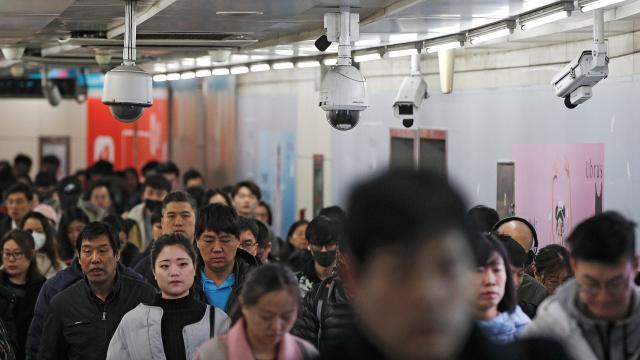Effective yesterday, consumers registering new phone numbers or purchasing SIM cards in China have to get their faces scanned under a new rule that orders citizens to submit their identities to facial recognition companies.
The policy, implemented by the Ministry of Industry and Information Technology (MIIT), purportedly intends to tie consumer identities to their phones so that they can’t transfer SIM cards, promising to “strengthen the management of real-name registration of telephone users to safeguard the legitimate rights and interests of citizens in cyberspace.” (This, from a Google translated version of the law.) The statement goes on with a fateful promise to: “lay a solid foundation for comprehensive governance in cyberspace.”
The policy gels with China’s decade-old policy of forcing consumers to tie their IDs to mobile phone numbers and the preexisting ban on anonymous online posts.
Reuters reports that biometric identification technology has already invaded at least one Chinese supermarket chain, a hotel, and public housing. Transportation systems in some cities have reportedly announced that they will use facial recognition to “classify passengers” for security checks.
Obviously, rules like this portend abuses of “legitimate rights.” China already reportedly governs public space with facial recognition tech by profiling and tracking Muslim minorities. Hong Kong protesters demonstrated general angst over pervasive Chinese surveillance the summer, sawing down lampposts believed to be feeding China facial recognition data, and Hong Kong subsequently banned facial recognition-evading masks.
Even state-run Chinese media denounced the prevalence of facial recognition in September over a deep fake app called Zao which came with loose data privacy policies allowed users to upload photos for fun, and possibly evil. (In that case, the MIIT did reportedly flag a need to “strengthen the security assessment of new technologies and businesses,” according to a CNBC translation of a statement.)
China’s booming facial recognition industry is steadying for global expansion. In September, the facial recognition company Megvii, owner of Face++, was reportedly valued at over $US1 ($1.5) billion, though Hong Kong delayed an IPO last month.
In a new in-depth report, the Financial Times points out that telecoms like ZTE, Dahua and China Telecom are lobbying the UN’s International Telecommunication Union (ITU) for international facial recognition regulations–a red line for human rights advocates, who feel that companies shouldn’t be making up the standards. Mehwish Ansari, head of ITU work at the digital human rights nonprofit Article 19, tells the Financial Times that “[t]here are virtually no human rights, consumer protection, or data protection experts present in ITU standards meetings.”
The Financial Times adds that setting the standards gives Chinese companies a leg-up in developing nations like Uganda which, without a facial recognition tech sector, depends on Huawei for their surveillance… needs?
If you think this is a foreign authoritarian regime problem, hold onto your butts, America. Though the US has blacklisted Chinese facial recognition technology, including Megvii, citing human rights abuses, the Department of Homeland Security is reportedly manoeuvring to implement facial recognition technology in 20 airports by 2021. Delta’s already testing a “biometric-based bag drop.”
We, too, have facial recognition in public housing, and we, too, are reportedly exploring options in public spaces. Just check out the demos on FACEFIRST which scan shoppers’ faces for their criminal records and try not to envision a scenario in which swiping some gum goes on your permanent record. Will Apple pull its phones? Probably no.
